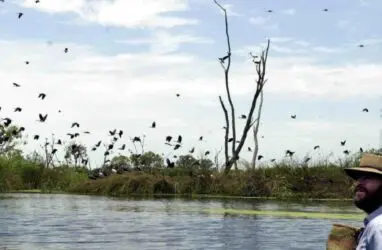Feed aggregator
Milestone for vanadium flow battery technology after electrolyte tests for Australian project
The post Milestone for vanadium flow battery technology after electrolyte tests for Australian project appeared first on RenewEconomy.
Record curtailment as rooftop solar reshapes biggest coal grid
The post Record curtailment as rooftop solar reshapes biggest coal grid appeared first on RenewEconomy.
Why Harris v Trump is the everything-but-climate election
The post Why Harris v Trump is the everything-but-climate election appeared first on RenewEconomy.
Australia’s most fossil dependent economy opens up to renewable energy highways
The post Australia’s most fossil dependent economy opens up to renewable energy highways appeared first on RenewEconomy.
High-speed rail plans may finally end Australia’s 40-year wait to get on board
More rooftop solar in cities would help solve NZ’s energy crisis – and build disaster resilience
Astronauts reveal what life is like on ISS – and how they deal with 'space smell'
Astronauts reveal what life is like on ISS – and how they deal with 'space smell'
SpaceX crew returns to Earth after historic mission
SpaceX crew returns to Earth after historic mission
Key flood defences in disrepair across England as wet autumn looms, data reveals
Leaked government figures show proportion of assets in adequate condition has fallen ‘significantly below’ target
Thousands of flood defences in England that are supposed to protect properties from serious damage are in a state of disrepair, according to official figures leaked to the Observer before what is expected to be a wetter than usual autumn.
Data from inside the Department for Environment, Food and Rural Affairs and the Environment Agency about the so-called “asset condition” of key flood defences shows the proportion of those regarded as being in adequate condition now stands at just 92.6%, compared with 97.9% in 2018-19. This is the proportion of defences judged to be fit for purpose after rigorous inspection by experts.
Continue reading...Astronauts reveal what life is like on ISS – and how they deal with 'space smell'
Titan sub disaster: Five key questions that remain
Titan sub disaster: Five key questions that remain
Magpie-swooping season is here. But you can avoid attack – if you play by their rules
From donning ‘pie-proof’ bike helmets to conversing with the songbirds, the key to avoiding avian conflict might be learning to speak their language, experts say
- Get our breaking news email, free app or daily news podcast
Down a gravel track in the backblocks west of Ipswich ride six middle-aged women. Their bikes are black, their shorts and exercise tops nondescript – but strapped atop their helmets are party hats.
“You know those little cone hats you used to wear as a kid?” Christina Slik says. “With the streamers on top and the reflective colouring?”
Sign up for a weekly email featuring our best reads
Continue reading...Breeding grounds, flight paths and climate change: Getting balance right on wind and solar approvals
The post Breeding grounds, flight paths and climate change: Getting balance right on wind and solar approvals appeared first on RenewEconomy.








